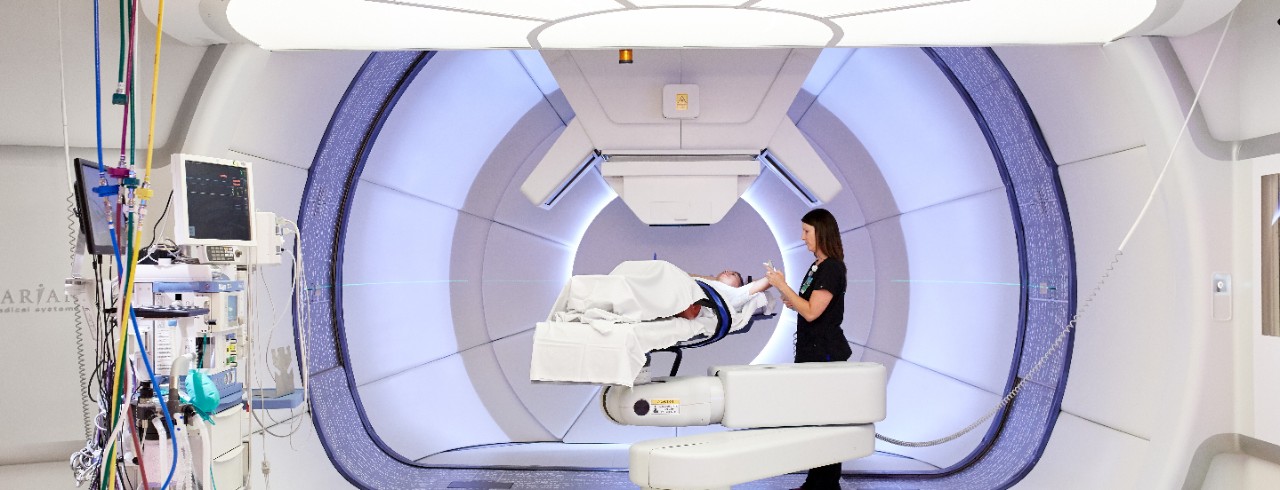
FLASH proton therapy trial begins on bone cancers in chest
University of Cincinnati Cancer Center leads research of ultra-high dose rate radiation therapy
Treatment of the first patient in a clinical trial of FLASH proton therapy for cancers in the bones of the chest has been completed at the Cincinnati Children’s/University of Cincinnati Medical Center Proton Therapy Center.
FLASH is a new mode of radiation therapy that can be delivered to a patient in less than 1 second. Research in the laboratory suggests that FLASH may be safer than standard forms of radiation, and the clinical trial is testing if that is true for patients with cancer.
The new study, called FAST-02, marks a significant achievement for the University of Cincinnati Cancer Center, which continues to lead the way in global research in the field of FLASH proton therapy.
It follows a breakthrough last year in the world’s first clinical trial of FLASH proton therapy in people, the FAST-01 study (FeAsibility Study of FLASH Radiotherapy for the Treatment of Symptomatic Bone Metastases). That focused on people with bone metastases in the extremities.
Now, Cancer Center researchers from Cincinnati Children’s and the University of Cincinnati are collaborating to establish the efficacy of ultra-high dose rate proton therapy in treating chest bone cancers. The FAST-02 study is sponsored by equipment manufacturer Varian Medical Systems.
Up to 10 patients, whose metastatic cancer has spread to their chest bones, will participate in the research clinical trial of FLASH proton therapy.
In pre-clinical testing, FLASH proton therapy has been shown to potentially reduce side effects experienced with conventional radiation. However, until recently the technology to generate FLASH radiation for tumors inside the body did not exist for cancer patients.
“Our dedicated team of researchers, clinicians, and staff are committed to advancing the field of cancer treatment and finding new ways to improve patient outcomes,” said John Breneman, MD, professor of radiation oncology at the University of Cincinnati Cancer Center and medical director of the Cincinnati Children's/UC Medical Center Proton Therapy Center.

John Breneman, MD, speaks with a patient. Photo/UC Health.
The Proton Therapy Center is a state-of-the-art facility that features cutting-edge technology and equipment, allowing researchers to develop and test new treatments for a wide range of malignancies.
“This trial of an ultra-high dose rate of proton therapy is just one of our efforts to develop new and innovative cancer treatments,” said John Perentesis, MD, who is a Cancer Center senior advisor, research director of the Proton Therapy Center and director of oncology and cancer programs at Cincinnati Children’s. “Our goal is to establish a foundation for future trials in brain tumors, sarcomas, lymphomas, lung cancer, and other malignancies, and we are excited about the potential impact this research could have on cancer care.”
“The promise of FLASH is to be able to deliver an entire course of treatment, which generally ranges from 25-40 treatments, in a single treatment at those ultra-high dose rates,” said Anthony Mascia, PhD, chief physicist at the Proton Therapy Center. “We currently are doing research studies into its efficacy, which if it works will upend radiation oncology.”
The $126 million Cincinnati Children’s/UC Medical Center Proton Therapy Center incorporates a $24 million, one-of-a-kind research facility, which includes a fully operational proton treatment room dedicated exclusively for research along with integrated laboratories. In addition, children and adults from around the world seek treatment for more than 30 types of cancer in two clinical therapy rooms at the center.
The Proton Therapy Center on the Liberty Campus of Cincinnati Children’s is one of only a few facilities in the world that can deliver FLASH proton therapy. With this latest clinical trial, the medical center continues to push the boundaries of cancer treatment – and to offer hope to patients and families affected by this devastating disease.
Read more about the FAST-01 trial.
Featured photo at top of a mock patient at a treatment gantry in the Proton Therapy Center. Photo/Cincinnati Children's.
Related Stories
UC cancer research presented at national meeting
May 26, 2023
University of Cincinnati Cancer Center researchers will present abstracts at the American Society of Clinical Oncology (ASCO) annual meeting 2023, held in Chicago June 2-6.
Head and neck, breast cancer research highlights AACR abstracts
April 14, 2023
University of Cincinnati Cancer Center researchers will present more than a dozen abstracts at the American Association for Cancer Research Annual Meeting 2023, held in Orlando, Florida, April 14-19, including findings that could advance treatments for head and neck and breast cancers.
Physics World names UC, Cincinnati Children's study among top 10 Breakthroughs of 2022
December 8, 2022
Physics World recognized the University of Cincinnati's first-in-human trial of FLASH radiotherapy as one of the Top 10 Breakthroughs of the Year for 2022.
